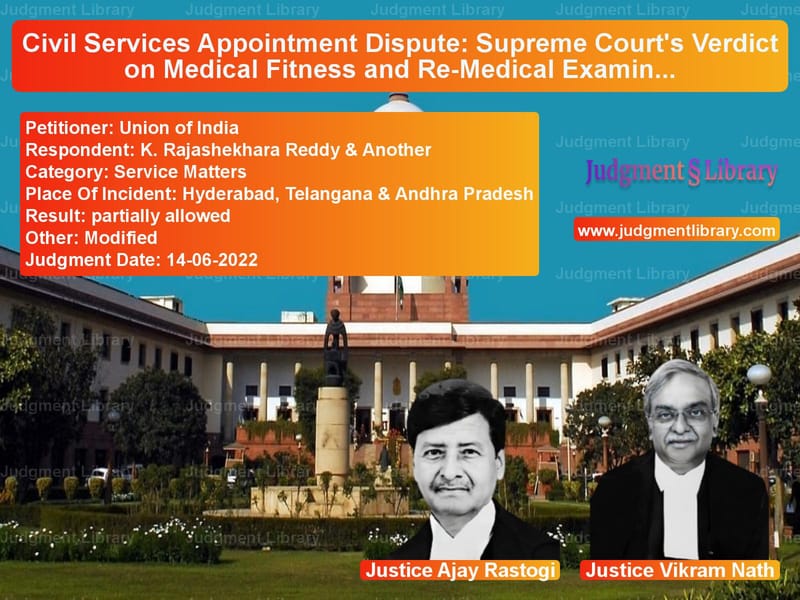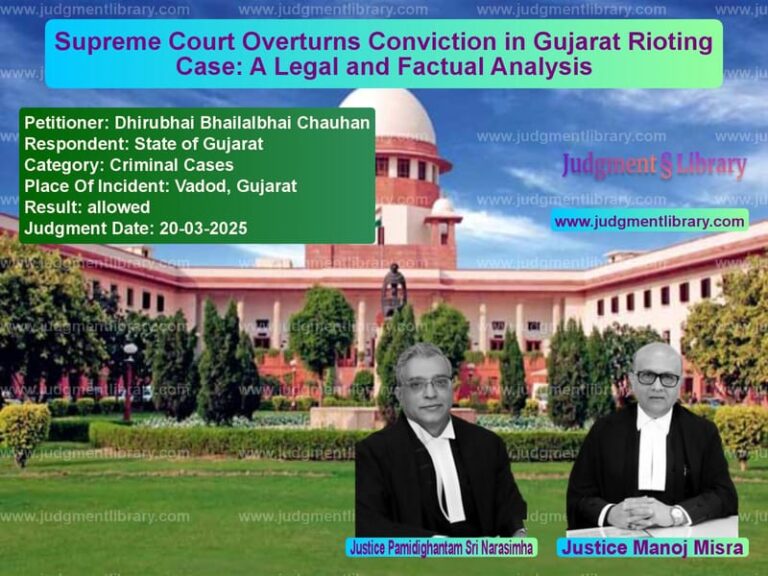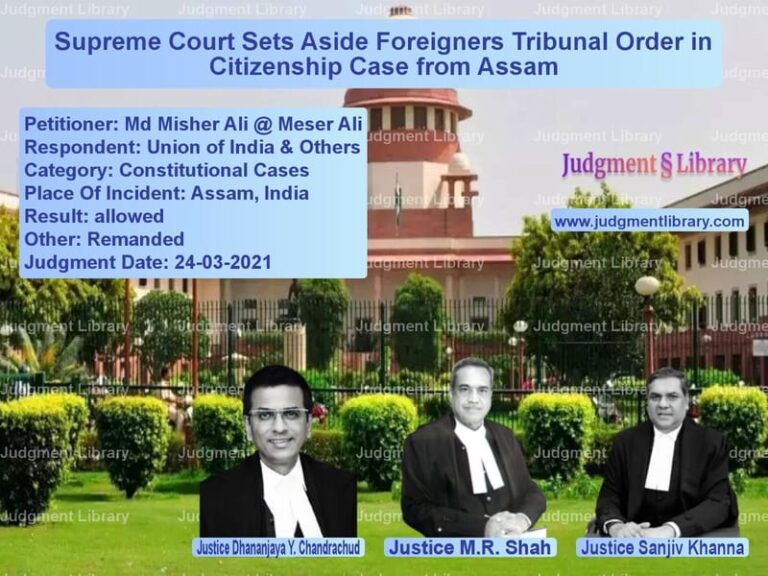Civil Services Appointment Dispute: Supreme Court’s Verdict on Medical Fitness and Re-Medical Examination
The Supreme Court’s recent judgment in the case of Union of India v. K. Rajashekhara Reddy & Another addressed a crucial dispute regarding the medical fitness criteria in civil services recruitment. This case revolved around the rejection of a candidate due to being declared ‘temporarily unfit’ based on Body Mass Index (BMI) requirements. The decision highlights the interpretation of medical fitness rules, the role of re-medical examination, and the broader implications for candidates appearing in civil service exams.
The controversy arose when the respondent-applicant, after clearing the Civil Services Examination (CSE) 2014, was found temporarily unfit due to a BMI exceeding the permissible limit. Despite later proving his medical fitness, his request for a re-medical examination was initially denied due to procedural time limits. The matter escalated from the Central Administrative Tribunal to the High Court and ultimately to the Supreme Court, which delivered a significant verdict.
Background of the Case
The Civil Services Examination (CSE) 2014 was conducted by the Union Public Service Commission (UPSC) to recruit officers for various Group ‘A’ and Group ‘B’ services, including IAS, IFS, and IPS. The respondent-applicant successfully cleared the preliminary and main examinations and was called for an interview on 2nd June 2015. However, during his medical examination on 3rd June 2015 at B.R. Ambedkar Hospital, New Delhi, his BMI was recorded at 32, exceeding the permissible limit of 30. As a result, he was declared ‘temporarily unfit.’
The final result of the Civil Services (Main) Examination 2014 was declared on 4th July 2015, recommending 1236 candidates for appointment. The respondent-applicant’s name was absent from this list but appeared in the consolidated reserve list on 19th January 2016 at serial number 16. He then requested a re-medical examination on 10th March 2016, claiming that he had met the required medical standards. However, his request was denied as it exceeded the stipulated six-month period under Rule 7(a)(vii) of Appendix-III of the CSE Rules 2014.
Petitioner’s Arguments
The Union of India argued that the respondent-applicant failed to request a re-medical examination within the prescribed six-month period from the date of his medical examination report (17th June 2015). The government maintained that Rule 7(a)(vii) of the CSE Rules 2014 clearly stated:
“In case of a candidate who is to be declared ‘Temporarily Unfit,’ the period specified for re-examination should not ordinarily exceed six months at the maximum.”
The petitioner contended that allowing exceptions beyond six months would create ambiguity and open the door for future abuses of discretion.
Respondent’s Arguments
The respondent-applicant countered that his name did not appear in the main list of selected candidates and was only included in the reserve list on 19th January 2016. He argued that he had no reason to seek a re-medical examination until his selection was confirmed in the reserve list. Within two months of this listing, he applied for a re-medical examination (10th March 2016), which should have been considered a reasonable timeframe.
He further pointed out that previous CSE medical examination reports were directly communicated to candidates, but in 2014, the procedure changed, and results were only uploaded online, potentially leading to confusion.
Key Observations of the Supreme Court
The Supreme Court analyzed the legal and factual aspects of the case. It acknowledged the procedural change in 2014, which shifted the responsibility of checking medical results to the candidates. However, it also emphasized the importance of adhering to prescribed time limits.
The Court observed:
“The period of six months stipulated under Rule 7(a)(vii) of Appendix III of the CSE Rules, 2014, must be read in conjunction with the word ‘ordinarily.’ This word cannot be interpreted in isolation to extend the period indefinitely.”
The Court further noted that exceptions could be made in special circumstances, such as for pregnant candidates who could not undergo medical examination within the prescribed time. However, in this case, the applicant had no such extraordinary circumstances, making his delay unjustifiable.
Final Judgment and Directions
While ruling against the respondent-applicant on legal grounds, the Supreme Court exercised its plenary power under Article 142 to do complete justice. The Court issued the following directives:
- The High Court’s decision ordering a re-medical examination was set aside.
- The respondent-applicant’s medical examination, conducted in compliance with the Court’s interim order, confirmed his fitness for all services.
- The Union of India was directed to consider his appointment based on his placement in the reserve list of CSE 2014.
- The appointment should be granted with notional benefits, including seniority and pay scale, but without back wages for the period he did not serve.
Conclusion
This landmark judgment clarifies the interpretation of medical fitness rules in civil service recruitment. While affirming the necessity of adhering to procedural timelines, the Supreme Court also demonstrated its ability to render equitable justice under Article 142. The case sets a precedent for future disputes regarding medical fitness and re-examination requests, ensuring fairness without compromising procedural integrity.
Petitioner Name: Union of India.Respondent Name: K. Rajashekhara Reddy & Another.Judgment By: Justice Ajay Rastogi, Justice Vikram Nath.Place Of Incident: Hyderabad, Telangana & Andhra Pradesh.Judgment Date: 14-06-2022.
Don’t miss out on the full details! Download the complete judgment in PDF format below and gain valuable insights instantly!
Download Judgment: union-of-india-vs-k.-rajashekhara-redd-supreme-court-of-india-judgment-dated-14-06-2022.pdf
Directly Download Judgment: Directly download this Judgment
See all petitions in Recruitment Policies
See all petitions in Public Sector Employees
See all petitions in Judgment by Ajay Rastogi
See all petitions in Judgment by Vikram Nath
See all petitions in partially allowed
See all petitions in Modified
See all petitions in supreme court of India judgments June 2022
See all petitions in 2022 judgments
See all posts in Service Matters Category
See all allowed petitions in Service Matters Category
See all Dismissed petitions in Service Matters Category
See all partially allowed petitions in Service Matters Category







